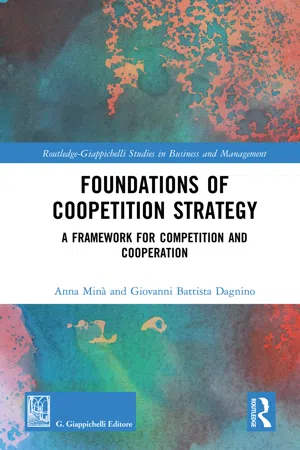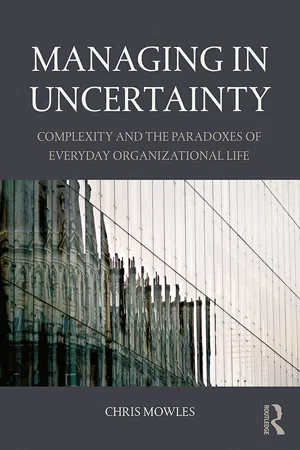Business
Paradox Theory
The Paradox Theory in business refers to the idea that contradictory elements can coexist and even complement each other. It suggests that successful businesses are able to navigate and leverage opposing forces, such as stability and change, efficiency and innovation, or short-term and long-term goals. Embracing these paradoxes can lead to greater adaptability and competitive advantage in the business world.
Written by Perlego with AI-assistance
Related key terms
5 Key excerpts on "Paradox Theory"
- eBook - ePub
Global Software Engineering
Virtualization and Coordination
- Gamel O. Wiredu(Author)
- 2019(Publication Date)
- Auerbach Publications(Publisher)
7Paradox of OrganizationIn organization theory, paradox refers to contradictory or conflicting yet interrelated factors that exist simultaneously. Paradox has been an influential framework for organizational research since its analytical power was espoused by Kim S. Cameron and Robert E. Quinn,1 Marshall S. Poole and Andrew H. Van de Ven,2 and Jennifer L. Sparr.3 It is useful for analyzing complex, plural, divergent, and disruptive situations in organizations. Its philosophical and rhetorical origins are traceable to the Megaric philosophers of 400 bc who studied the well-known liar antinomy. Their famous example of paradox is this logical one: if a man says, “I always lie,” how should we understand what he says? There are also rhetorical paradoxes which are statements that appear to be contradictory or absurd but are true. An example is in George Orwell’s Animal Farm : “all animals are equal, but some are more equal than others.” The theoretical tension in logical paradoxes and literary tensions in rhetorical paradoxes have led the way to the study of organizational paradox. In Poole and Van de Ven’s admonition to scholars to embrace organizational paradoxes and use them to build theories, they wrote:An alternative strategy for theory building can be proposed: Look for theoretical tensions or oppositions and use them to stimulate the development of more encompassing theories. This strategy requires an exploration of the tradition of theoretical debate surrounding important issues, an identification of alternative or opposing theories or explanations, and discovery of ways of relating, contraposing, or integrating them. The result will be theories less susceptible to the limitations of perspective which attend many middle range theories.4On the whole, paradox has proven to be both an ontological and epistemological device for handling organizational tensions to generate theories. It confronts rather than ignores those tensions that reflect incompatible or inconsistent theories. The theories may appear inconsistent or incompatible, but that may be due to the underlying assumption, perspective, and explanatory principle. If theory development is a discourse, then to use paradox to develop global software engineering (GSE) coordination theory is to use it as a rhetorical device. For this reason, Poole and Van de Ven propose acceptance of paradoxes, spatial and temporal separation of paradoxes, and the introduction of new terms (literary devices) to resolve the paradoxes. - eBook - ePub
Foundations of Coopetition Strategy
A Framework for Competition and Cooperation
- Anna Minà, Giovanni Battista Dagnino(Authors)
- 2021(Publication Date)
- Routledge(Publisher)
et al., 2019, p. 108).Overall, “since paradoxes are persistent, the tensions are never fully resolved, but only managed through mechanisms that recognize their persistence” (Keller & Sadler-Smith, 2019, p. 165). Consequently, firms should acknowledge what are the opposites they have to deal with (e.g., rational planning vs. emergent planning, commitment vs. flexibility, mass market vs. niche market), rather simply than choosing between them (Handy, 1994; Pinto, 2019), and understand that to respond to such opposite demands implies ongoing responses (Keller & Sadler-Smith, 2019; Pinto, 2019; Smith & Tracey, 2016).As we can see, for this reason “the paradox literature has become increasingly crowded” (Smith & Lewis, 2011, p. 381). We have seen progressions in understanding paradox, to theorize and enrich the current debate on paradox and paradoxical tensions (De Keyser, Guiette & Vandenbempt, 2021). Scholars acknowledge that paradoxical reasoning is useful in supporting future strategic contexts as it challenges the dominant logics. As Poole and Van de Ven (1989, p. 563) underscored, “there is a tendency for the theory to dominate researchers’ thinking and “bind the researcher’s judgment”. Accordingly, researchers tend to iron out problems, set the measures, test the theory and defend them. Then, they progressively become unable to consider aspects that were not previously included in their theorizing, and hence ignoring the “less and less correspondence to the multifaceted reality of strategizing itself” (Rasche, 2008, p. 182).Considering the role of paradox in strategic management would allow to dig deeper into the current understanding of strategic reality (Lewis & Kelemen, 2002), and rethink about what is taken-for-granted (Lado, Boyd, Wright & Kroll, 2006, p. 118).Second, it allows to critically think about paradox. Paradox could not be conceived as something that is impossible to occur. As Czarniawska (2005) pointed out, while non- paradoxical theories look more elegant a precise, they tend to ignore how complex is the management realm. Man-agement realm is paradoxical. Then, scholars should embed paradoxes in elaborating their strategy theories. - eBook - ePub
Managing in Uncertainty
Complexity and the paradoxes of everyday organizational life
- Chris Mowles(Author)
- 2015(Publication Date)
- Routledge(Publisher)
By taking a radically social view of mind, that it arises inter- and intra-subjectively, I am not assuming that we form individual mental representations of a world ‘out there’, but have argued instead that consciousness and self-consciousness arise through processes of mutual recognition. These social processes create unconscious drives which we are barely aware of, thus making it highly problematic to suggest that we can knowingly surface the way we make sense of the world and consciously change it.Paradox as a dynamic equilibriumLastly, in this section I treat an article recently published in a leading management journal, the Academy of Management Review. The reason for doing so is because both scholars have made a reputation for themselves in writing about paradox, and I think as an example it helps us understand what is valued in management research and the kinds of assumptions it is based on, in particular that paradox can be instrumentalized by managers to unleash creativity and positivity, ideas which we previously encountered in the psychology literature.In a wide-ranging article, Smith and Lewis (2011) try to synthesize 360 journal articles about paradox across 12 academic journals in order to increase conceptual clarity. They do so, they argue, in order to integrate the differing conceptions of paradox into an overall model to further organizational theorizing. Their aim is to ‘leverage the potential’ of different conceptions of paradox by developing a dynamic equilibrium model, understood in terms of biology, or systems dynamics, where opposing forces are maintained in terms of a fluctuating homeostasis.They set out their own understanding of paradox as being the property of a system: ‘First, paradox denotes elements, or dualities, that are oppositional to one another yet are also synergistic and interrelated within a larger system’ (2011: 386). The paradox turns on the interrelationship of the duality across an internal boundary and defined by an external boundary, which binds the paradox and allows it to persist over time. The authors make a distinction between paradox and dilemma, and paradox and dialectic. - eBook - ePub
The Power of Paradox
Harness the Energy of Competing Ideas to Uncover Radically Innovative Solutions
- Deborah Schroeder-Saulnier(Author)
- 2014(Publication Date)
- Career Press(Publisher)
An organizational equivalent of inhale and exhale is that a company needs to satisfy the customer and satisfy the shareholder. The part and whole consideration is that a company is never alone in an industry. And the organizational equivalent of activity and rest is stability and change.In contrast to the inevitable paradoxes, there are those that are situational. For example:Situation—Parenting: Teach my child and let her learn herself.Situation—Firefighter: Follow formal processes and be flexible to the emerging needs.Situation—Functional leader: Focus on my function and focus on the organization.Often unaware, we opt into these chosen paradoxes by becoming involved in certain situations. We can avoid them only if we avoid the context in which they occur.In choosing to start a business that involves employees, a founder becomes involved in paradoxes of leadership and organization. Recognition of paradox is crucial. For example, the interdependent pair of global and local faced by Livli Hotels wouldn’t exist if the structural model for the company were a single-nation company. Instead, the company decided on a business model that made “global and local” a key pair for them.Paradoxes don’t only come in pairs. As the complexity of the situation increases, so does the complexity of paradoxes. Sometimes issues are nested within each other or stacked on top of one another:Simple pairs: An example is “learning from self” and “learning from others” in the context of pursuing career-development goals.Complex sets: An example is “manufacturing and legal and marketing”; in a matrix organization, it might be “product and geography and function.” - Ann Langley, Haridimos Tsoukas(Authors)
- 2016(Publication Date)
- SAGE Publications Ltd(Publisher)
outside the prevalent research program: Researchers have studied distinctive organizational paradoxes such as the uniqueness paradox (Martin et al., 1983) and the paradox of (n)ever changing world (Birnholtz et al., 2007); others have studied theory-specific tensions and contradictions. For instance, Holm (1995) addressed the paradox of embedded agency within institutional theory.Noteworthy are variations within the paradox research program, particularly as they reveal different affinities and potential influences of dialectics. Poole and Van de Ven (1989) and Adler et al. (1999) highlighted the dialectic notions of transcendence and duality. By contrast, Smith and Lewis (2011) appear to focus on the coordination, acceptance, and management of contradictions more than on their genuine resolution. Yet their study resonates with the dialectic approach in highlighting vicious and virtuous circles and in considering how responses to paradoxes can affect their development.Paradox and Dialectics: From Differences to Complementarities
As we have seen, at least as reflected in their central tendencies, the differences between dialectics and paradox are significant. Dialectics constitutes a broad process perspective and has a more explanatory bent; its focus is more macro, holistic, historical, structural, social, cultural, and political; it highlights social structures, conflict, development, and historical change. By contrast, often dealing with improving the well-being and performance of individuals and groups, paradox research has a more interventionist and normative orientation. This literature considers a broad range of tensions and contradictions and ways of addressing them and tends to be more agential, micro, psychological, and cognitive.
Learn about this page
Index pages curate the most relevant extracts from our library of academic textbooks. They’ve been created using an in-house natural language model (NLM), each adding context and meaning to key research topics.




